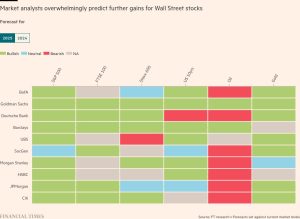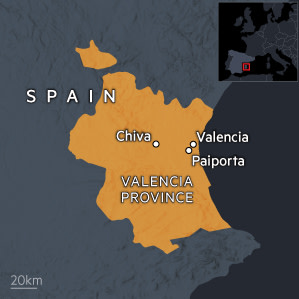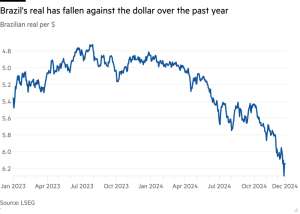What are the main campaign pledges?
German voters are heading to early elections after chancellor Olaf Scholz’s three-way coalition imploded under the strain of the country’s economic and security challenges.
On February 23, they will decide which parties will be given the task of reviving the Eurozone’s largest economy, which faces a potential contraction next year and grapples with the repercussions of the war in Ukraine.
The attack carried out by a Saudi national on a Christmas market in Magdeburg, killing five and injuring more than 200, has left the country in a state of shock. The threat of Russia meddling and boosting the far-right Alternative for Germany (AfD) party, as well as the emergence of a far-left party led by Sahra Wagenknecht, have added to the challenge for the established parties.
The Volksparteien manifestos outline sharply different visions for Germany: the Christian Democrats led by Friedrich Merz are campaigning on a pro-business, anti-immigration platform, while the Social Democrats and the Greens advocate greater state intervention.
Polls suggest, however, that these parties, which have ruled out governing with the AfD, may have to find compromises to form a majority coalition after the elections.
Where do Germany’s main candidates stand on taxes and benefits?
CDU chief Merz, who is leading in the polls, has made tax cuts a cornerstone of his manifesto. His proposals include capping corporate taxes at 25 per cent, abolishing the solidarity levy on high-income earners that was introduced to pay for reunification, reducing employee contributions and lowering income tax.
To help fund these measures, Merz wants to reform the welfare system and toughen eligibility criteria for those on benefits.
Scholz’s Social Democrats focus on policies aimed at supporting low-income households: Scholz proposes reducing VAT on groceries and lowering income taxes for poorer families, while raising income and inheritance taxes for wealthier households. He has pledged to increase the minimum wage to €15, from about €12.80, and commit the government to stable pensions.
The Greens, part of Scholz’s “traffic light” coalition, plan a billionaire tax to fund green transition subsidies for low-income households. They, too, want to lift the minimum wage to €15 and set up a pension stabilisation fund.
The CDU, SPD and Greens have ruled out extending the retirement age.
Has political consensus shifted on the debt brake?
The country’s Schuldenbremse, which caps the state’s new borrowings at 0.35 per cent of GDP annually, was a major factor in the collapse of Scholz’s coalition in November. The liberal FDP party, led by finance minister Christian Lindner, balked at attempts by the SPD and the Greens to circumvent the mechanism to plug a budget shortfall. Looming large over the debate is the country’s constitutional court, which invalidated the coalition’s budget in 2023.
Relaxing the provision would create fiscal room to address growing defence spending needs and modernise the country’s ageing infrastructures.
However, Merz’s manifesto has no mention of any change to the debt brake, which remains popular in conservative circles. Instead Merz is seeking €50bn in spending cuts from welfare reform and another €50bn from a shake-up of the immigration system.
By contrast both the SPD and the Greens want to ease the provision. The former suggests a “moderate” reform while the latter call for a “sensible” change to boost public investments. Any reform would require a two-third majority in parliament, making it a likely focus in post-election coalition talks.
How do candidates plan to revive Germany’s flagging industrial engine?
The CDU, SPD and the Greens all pledge to slash electricity prices, which have hurt Germany’s industrial companies. Energy costs have soared after Russia stopped its gas supplies at the start of its full-scale invasion of Ukraine in 2022.
The CDU has left the door open to a return to nuclear power and aims to curb green regulations on companies.
The SPD, which stands by the country’s decarbonisation targets, proposes a €100bn infrastructure investment fund and a 10 per cent tax incentive for companies that invest in Germany.
The Greens also push for investment incentives to accelerate the transition to renewable energy.
What do parties propose on immigration?
Under pressure from a surging AfD, the CDU’s Merz has pledged to restore “law and order” by curbing immigration, processing asylum applications in third countries and speeding up deportations of convicted migrants. CDU politician Jens Spahn has even proposed offering €1,000 to any Syrian refugee willing to return home following the unravelling of Bashar al-Assad’s regime.
The SPD also plans to accelerate deportations of criminals and increase incentives for voluntary repatriations.
However, like the Greens, the SPD opposes processing asylum applications in third-party countries.
What are the main differences on defence and support for Ukraine?
Defence policy and support of Ukraine are rare areas of alignment between CDU leader Merz and Green leader Robert Habeck, who is also the current economy minister. Both advocate intensifying military aid to Kyiv, including by delivering Taurus long-range missiles, among the world’s most advanced. Merz, a staunch Atlanticist, wants to expand economic sanctions on Russia to increase the cost of the war for Vladimir Putin.
Like the CDU and the Greens, Scholz has pledged to at least meet the Nato target of 2 per cent of GDP for defence spending. But on Ukraine he has emphasised caution, portraying himself as a cool-headed leader focused on preventing escalation with Russia and a solution to end the conflict. He has sought to position himself as a possible mediator by calling Putin in December.
This approach resonates with voters leaning towards the AfD and Sahra Wagenknecht’s party.
Additional reporting by Guy Chazan and Laura Pitel
#main #campaign #pledges






